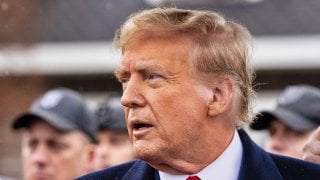Is Donald Trump Really a Fascist?
If you think that Donald Trump is a clear and present danger, then you lump him in with some of the worst characters of the twentieth century. If you think he’s a freedom fighter battling for the vox populi, then you make specious arguments to distract from his authoritarian proclivities.
Last night, Kamala Harris appeared on NBC in an interview with Hallie Jackson. After covering a wide swath of territory, from abortion to immigration, Harris ended by focusing on the issue of Donald Trump’s extremism. The thrust of her critique was that he is not simply loopy but a madman. She noted that he has called for terminating the U.S. Constitution and that the “American people are being presented with a choice here about whether we want a president who understands that America must stand strong as a leader around the globe, or an individual in Donald Trump who openly admires dictators.”
Indeed, he does. As Jeffrey Goldberg, the editor of The Atlantic, observes in a new essay, Trump is not merely enamored of dictators but also disdainful of an American military that pledges its loyalty to the Constitution rather than an individual president. In Goldberg’s words, “Trump has responded incredulously when told that American military personnel swear an oath to the Constitution, not to the president.”
The result is that a debate has now begun over whether Trump deserves the unflattering sobriquet of fascist. John Kelly, Trump’s former chief of staff, seems to think he does. In an interview with The New York Times, he observed that the Donald has expressed his admiration for Hitler on a number of occasions and that he met the definition of a fascist. It’s also the case that Mark A. Milley, the former chairman of the Joint Chiefs of Staff, has availed himself of the “f word” as well. He told Bob Woodward that the president is “fascist to the core” and “the most dangerous person to this country.”
For good measure, the Times also has gone to Robert A. Paxton, a famous historian of France during the Vichy regime, to assess Trump’s fascist bona fides. He comes down on the side of fascism but is equivocal about what it all adds up to politically. Indeed, he points out that Trump’s support may be broader than was either Hitler’s or Mussolini’s, both of whom were ultimately hoisted into power by conservative elites rather than winning an election outright.
The best contemporary discussion of the origin of the will to power in modern mountebanks, such as Trump, can be found in Ferdinand Mount’s recent book Big Caesars and Little Caesars. Mount is concerned to show that the notion that the old Whig interpretation of history as a steady march of progress has once more been debunked since 1989. He notes that Plato, Machiavelli, and Nietzsche, among others, were all advocates of authoritarianism. Indeed, he notes that Nietzsche maintains that the great man demonstrates his greatness precisely by reveling in his mendacity: “he must be forced to fight his way up with ingenuity and disingenuousness; his will to live must swell into an unconditional will to power and to supremacy.” Sound familiar?
Whether Trump has cracked a page of Nietzsche is more than a little questionable. One of his ex-wives related that he did have a copy of Hitler’s collected speeches by his bedside. Whether he really had the patience to peruse that farrago of Blut und Boden nationalism may also be wondered. As his former national security adviser John Bolton suggested on Wednesday, “You know, Adolf Hitler wrote a profoundly troubling book called Mein Kampf, ‘My Struggle.’ Donald Trump couldn’t even read his way all the way through that book, let alone write something like it.”
It’s hard to avoid the suspicion that what the hugger-mugger about Trump’s fascist bona fides is really about is how polite society decides to talk about this rumbustious figure. It’s becoming just one more talking point. If you think that Trump is a clear and present danger, then you lump him in with some of the worst characters of the twentieth century. If you think he’s a freedom fighter battling for the vox populi, then you make specious arguments to distract from his authoritarian proclivities as Scott Jennings did on CNN when he claimed that the real Hitlers are thousands of left-wing zealots running around on college campuses. Then there is Bolton, who delivered the unkindest cut by telling CNN’s Kaitlan Collins that Trump isn’t smart enough to qualify as a fascist. According to Bolton, “his behavior alone is troubling enough. To be a fascist, you have to have philosophy. Trump’s not capable of that.” Maybe we’re about to find out.
About the Author:
Jacob Heilbrunn is editor of The National Interest and is a nonresident senior fellow at the Atlantic Council’s Eurasia Center. He has written on both foreign and domestic issues for numerous publications, including The New York Times, The Washington Post, The Wall Street Journal, Financial Times, Foreign Affairs, Reuters, Washington Monthly, and The Weekly Standard. He has also written for German publications such as Cicero, Frankfurter Allgemeine Zeitung, and Der Tagesspiegel. In 2008, his book They Knew They Were Right: the Rise of the Neocons was published by Doubleday. It was named one of the one hundred notable books of the year by The New York Times. He is the author of America Last: The Right’s Century-Long Romance with Foreign Dictators.
Image: Shutterstock.


